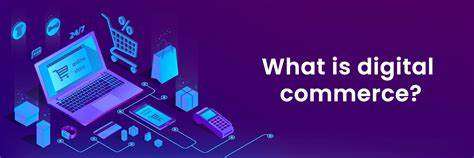What Is Digital Commerce? Everything You Need to Know

In today’s connected world, digital commerce has transformed how businesses operate and engage with customers. Often known as e-commerce, digital commerce goes beyond simple online shopping. It involves buying and selling goods, services, or digital products through a variety of online channels.
What Does Digital Commerce Include?
Digital commerce covers transactions conducted through websites, mobile apps, social media platforms, online marketplaces, and other digital touchpoints. Unlike traditional commerce, which depends on physical stores and face-to-face interactions, digital commerce leverages technology to offer seamless, scalable, and global business opportunities.
It supports both business-to-consumer (B2C) and business-to-business (B2B) transactions, spanning sectors like retail, healthcare, finance, and entertainment. Beyond physical products, it also includes subscriptions, digital downloads, and online services such as consultations.
Key Components of Digital Commerce
Digital commerce relies on several essential elements that combine to create an efficient and customer-focused online business ecosystem:
- E-Commerce Platforms: Software solutions such as Shopify, Magento, or SAP Hybris that power online stores, manage product catalogs, and handle transactions.
- Payment Gateways: Secure services like PayPal, Stripe, or Square that process payments safely and efficiently.
- Digital Marketing: Techniques including SEO, social media advertising, and email campaigns that attract traffic and boost conversions.
- Customer Experience Tools: Features like personalized recommendations, chatbots, and omnichannel support that enhance customer satisfaction.
- Logistics and Fulfillment: Systems managing inventory, order processing, and shipping to ensure timely delivery.
- Analytics and Data Management: Tools tracking customer behavior, sales trends, and business performance to support informed decisions.
Together, these components enable businesses to deliver comprehensive digital commerce experiences.
Types of Digital Commerce
Digital commerce takes different forms depending on the business model and target audience:
- B2C (Business-to-Consumer): Companies sell directly to end customers (e.g., an online clothing retailer).
- B2B (Business-to-Business): Businesses sell products or services to other businesses (e.g., wholesalers supplying retailers).
- C2C (Consumer-to-Consumer): Consumers sell directly to other consumers using platforms like eBay or Etsy.
- D2C (Direct-to-Consumer): Brands sell directly to consumers through their own websites or apps.
- Subscription-Based Commerce: Customers pay recurring fees for ongoing access to services or products, such as streaming platforms or subscription boxes.
Each model requires specific strategies to best serve its customers.
Benefits of Digital Commerce
Digital commerce offers many advantages to both businesses and customers:
- Global Reach: Enables businesses to connect with customers worldwide, overcoming geographic limits.
- 24/7 Availability: Online stores operate all day, every day, offering convenience and ongoing revenue.
- Cost Efficiency: Reduces costs tied to physical stores such as rent and utilities.
- Personalization: Uses data analytics to offer tailored experiences and build customer loyalty.
- Scalability: Digital platforms can easily manage increased traffic and sales without major changes.
- Data Insights: Real-time analytics support better marketing, inventory management, and customer engagement.
Challenges of Digital Commerce
Despite its advantages, digital commerce presents several challenges:
- Competition: The crowded online marketplace requires strong branding and exceptional customer experience.
- Security: Protecting customer information and securing transactions is vital to maintaining trust.
- Technical Complexity: Building and running reliable digital commerce platforms requires specialized skills.
- Logistics: Managing shipping, returns, and inventory across regions can be complicated.
- Customer Expectations: Consumers expect fast, smooth, and personalized experiences, demanding ongoing innovation.
Overcoming these challenges requires strategic planning and investment in the right technology and expertise.
How Businesses Can Succeed in Digital Commerce
Success in digital commerce often involves:
- Choosing the Right Platform: Select an e-commerce solution that fits your business needs, growth plans, and budget.
- Optimizing User Experience: Design mobile-friendly, easy-to-navigate websites and simplify the checkout process to reduce cart abandonment.
- Investing in Marketing: Combine SEO, paid advertising, and social media to attract and retain customers.
- Leveraging Data: Use analytics to personalize experiences and guide business decisions.
- Ensuring Seamless Integration: Work with trusted payment, logistics, and customer service partners to build a smooth ecosystem.
- Staying Agile: Adapt quickly to new technologies and changing customer preferences to stay competitive.
How Nvizion Helps
Nvizion empowers businesses to succeed in digital commerce by delivering tailored solutions and expert guidance. With deep experience in e-commerce platforms, digital marketing, and customer experience optimization, Nvizion helps companies overcome challenges and achieve their digital objectives.
Our services include:
- Designing scalable digital commerce platforms
- Integrating payment gateways and logistics systems
- Implementing personalization and omnichannel strategies
- Driving targeted marketing campaigns
- Providing ongoing support
Partnering with Nvizion enables businesses to build customer-focused, scalable digital commerce operations that drive growth and satisfaction.
